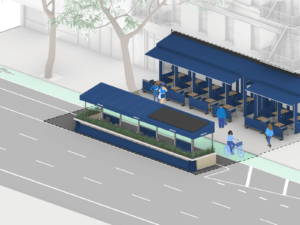Shaken by war and existentially disoriented, most veterans struggle to reintegrate and find work. A nonprofit food farm on the outskirts of New York City is being eyeballed as a possible housing and training solution for displaced veterans. The masterplan by Ennead Architects and RAFT Landscape Architecture includes eight micro-housing units for individuals or couples.
The homes, equipped with a bedroom, bathroom, and kitchenette, will all be programmatically linked by a community building for living, dining and instruction. The housing units, which are positioned in relationship to one another, rest on piers to “sit lightly on the land” and are interconnected by raised decks. The architects declined to install a living room in order to encourage tenants to use the community building for leisure. Meanwhile, the existing farmhouse, hay loft, and barn will be renovated.
“It’s about striking a balance between creating privacy for the individual and fostering a sense of community with shared spaces that open out to the view,” said Andrew Burdick, director of Ennead Lab, the architecture firm’s public interest and pro-bono division.
Sited on 19 acres in the hilly Hudson Valley, the shed-like dwellings are designed to meet Passivhaus standards of extremely low energy consumption. The configuration of the buildings – a quadrangle surrounded by residences with linked porches, takes after Thomas Jefferson’s academic village at the University of Virginia.
Veterans will receive instruction and mentorship, as well as job placement at nearby farms during harvest peak season. On the Heroic Food Farm site, they will raise livestock and cultivate produce in the greenhouses. Though small in scale, Burdick hopes the food farm can become a prototype to help plug the gap in the U.S. labor market, whereby a simultaneous shortage of agricultural workers and high unemployment among veterans presents a promising opportunity to connect those dots.
According to report by the Wall Street Journal, the shortage of farm workers reduces agricultural production by roughly 9.5 percent per year. Statistically, one possible cause is that 30 percent of farmers are over the age of 65, while less than 10 percent are below 35.
Screenwriter Leora Barish, founder of Heroic Food Farms, told Architect Magazine: “We know that supportive housing is one of the keys to sustaining programs for returning veterans.” Currently, New York ranks among the top ten states with the highest veteran population and veteran unemployment rate.










